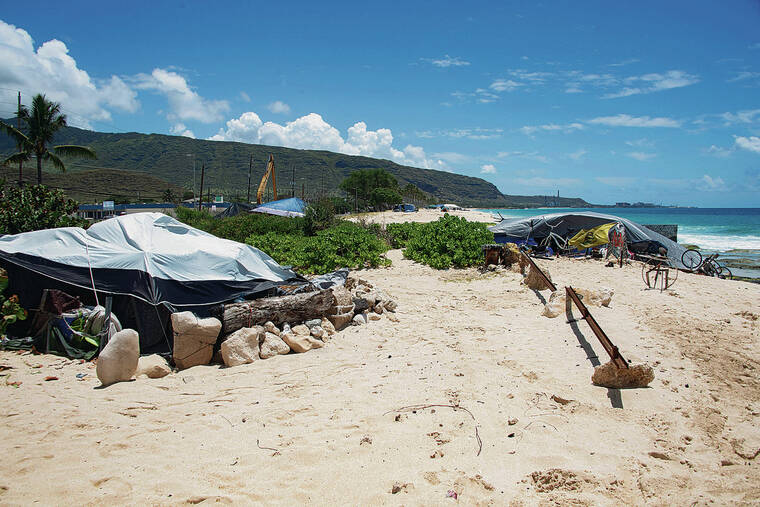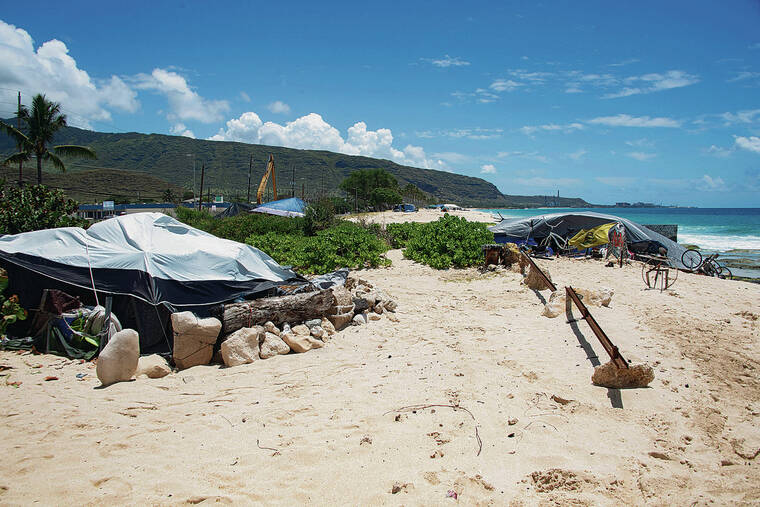
Mahalo for supporting Honolulu Star-Advertiser. Enjoy this free story!
Outreach workers from the Kealahou West Oahu social service agency on Monday began notifying members of a Nanakuli homeless encampment that the city plans to close a mile-long portion of Ulehawa Beach Park for a week and clean up the area once again as an October court date approaches challenging the city’s homeless policies.
It’s the same area where Justin D.I. Akana, 62, was stabbed to death Nov. 7 allegedly over a dispute about money and cigarettes. A grand jury later indicted Dennis Wilson, 28, with second-degree murder.
“There are a lot of concerns from the community in that area,” said Tanya Tehotu, executive director of Kealahou West Oahu. “We know that it needs to be cleaned. You can see the debris from the road.”
The city plans to close the area from Moihihi Street to Depots Beach near Haleaka Avenue — where about 40 people live — from 10 p.m. April 24 until 5 a.m. May 1.
About 125 people live at an even bigger encampment on the Makaha end of the beach but do a much better job of keeping the area clean, Tehotu said.
The operation represents one of the latest enforcement efforts by the city ahead of an October court date over a legal challenge from the American Civil Liberties Union of Hawaii that it’s homeless polices are illegal and unconstitutional.
The ACLU particularly wants Honolulu’s sit-lie ban, park closure rules, camping prohibition in city parks and the 12-year-old sidewalk nuisance and stored property ordinances ruled illegal and unconstitutional in Circuit Court.
Taylor Brack, staff attorney for the ACLU of Hawaii, told the Honolulu Star-Advertiser in an email Monday, “In conducting any sweep, the city is obligated to respect the constitutional rights of any person who is impacted by the sweep. The City must provide adequate notice to all residents before a planned sweep of an encampment. The City must also take care to store any personal property that is taken in the sweep and give the owner of that property a meaningful opportunity to reclaim it.”
In March in an unrelated homeless case over a homeless sweep on Maui, the Hawaii Supreme Court ruled in favor of the ACLU.
The court found that Maui County ignored written contested case hearing requests from some occupants of a “large” homeless encampment on Amala Place near Kanaha Pond and the Wailuku-Kahului Wastewater Treatment Plant.
The court wrote in its decision that Hawaii’s Constitution states, “No person shall be deprived of life, liberty or property without due process of law. … The Fifth Amendment to the United States Constitution similarly states, ‘No person shall be … deprived of life, liberty, or property, without due process of law.’”
“Today, we hold that unabandoned possessions of houseless persons constitute property protected by the due process clause of Article I, Section 5 of the Hawai‘i Constitution,” the court wrote in its decision.
Maui County officials told the Star-Advertiser following the decision that they respect the court’s opinion and do not plan to appeal.
City spokesperson Scott Humber told the Star-
Advertiser in an email earlier this month that the “ACLU Hawaii filed a motion for interlocutory appeal, asking the Court to allow them to immediately appeal the decision on the preliminary injunction. The Court denied this request, so the parties are proceeding to prepare for the permanent injunction proceeding. The City anticipates that Plaintiffs will file a motion to certify the case as a ‘class action’ shortly, which the City will vigorously oppose.”
Asked for comment about the Supreme Court’s ruling regarding the Maui sweep, Humber said, “The Hawaii Supreme Court in its recent ‘homeless’ decision involving the County of Maui recognized that the City and County of Honolulu has a constitutionally sound pre- and post-deprivation process that addresses the concerns raised by ACLU Hawaii against the County of Maui’s ‘take and destroy’ process. The City is confident that a similar challenge to Honolulu’s ordinances on the grounds presented in the Maui County case would not succeed and will continue to pass constitutional scrutiny as decided by Circuit Court and recognized by the Supreme Court.”
On Monday, Nathan “Nate” Serota, spokesperson for the city’s Department of Parks and Recreation, told the Star-Advertiser in an email that the city last enforced its stored property ordinance in the same area of Ulehawa Beach Park in August, “but not to this extent and not with a park closure.”
Parks and Recreation staff have been requested from “across the island” to help in the cleanup, along with employees from the Department of Facility and Maintenance who regularly enforce the city’s stored property and sidewalk nuisance ordinances, along with a second DFM crew.
Asked about other recent enforcement actions, Serota said the city “conducted a large-scale SPO (stored property ordinance) enforcement (at) DeCorte Neighborhood Park in Kalihi on September 29, 2023. There was also an enforcement for undeveloped park land in Velzeyland in October 2023. Kea‘au Beach Park also saw these larger enforcements in October 2019 and October 2020. There is an upcoming large enforcement at Kuilei Cliffs Beach Park at the end of this month.”
During the city’s last cleanup of Ulehawa Beach Park, state Rep. Darius Kila (D, Nanakuli-Maili) said, eight tons of items were collected.
“I think this is long overdue and well received and welcomed,” Kila said. “This stretch of beach has not just been inundated by homeless encampments, but illegal dumping, trash, and there was a murder. If the public cannot safely access those areas, this is what the county has to do.”
Most of the items in the area “appear to be for household use,” Kila said, but sometimes “vehicles need to be towed.”
He appreciates the continuing efforts of outreach workers to help homeless people improve their lives and get housed but called it “disheartening” when “most of the time it’s not accepted.”
Most of the homeless people in the area are from the Waianae Coast, Tehotu said, “and a lot of them were staying with family before they were asked to leave their homes for whatever reasons.”
She estimates that up to half have been involved with Oahu’s homeless “system” to some extent, while the rest are considered “service resistant.”
While most of the island’s homeless population remains homegrown, Tehotu said all parts of Oahu are seeing more people from the mainland either becoming homeless or relocating specifically to tap into homeless services.
“Hawaii is expensive,” she said. “Even a gallon of milk is $12. Islandwide we’re experiencing an increase from the mainland. They come here with good intentions, and some get evicted on the mainland and want to access our homeless system. It’s not just the West side. It’s happening all over Oahu.”
Between now and the weeklong closure of Ulehawa Beach Park, social workers from Kealahou West Oahu plan to talk to the homeless in the area to encourage them to move off the beach and into shelters, where they also can get help with their underlying issues.
“Every day we’re going to let them know as the pressure becomes more,” Tehotu said. “The goal is to be there when they do change their mind.”
Read More: World News | Entertainment News | Celeb News
Star Ads








